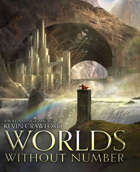I’ve spoken about stealing from Mörk Borg and Mouseguard — now it is Starforged. In Starforged:
Cutscenes can reveal a lot about your game. They can show how a faction or town views the players. For example, as a party leaves a town after completing good deeds, perhaps a toast is held in their honor at the tavern—where potentially a less than honorable individual sits in silence, taking the information in. Or the tavern patrons could all state how lucky they were the PC’s came—and they hope only to return the favor (setting up for a possible deus ex machina down the road).
Cutscenes also highlight tone. While gameplay should be reinforcing the tone of your game, having cutscenes are like that edge highlight in a miniature—bringing additional attention to a specific point. A grim world where things do not improve, even with the party’s help, can be reinforced by a cutscene of the rescued town falling back into ruin the moment the party rides off to their next goal.
Finally, cutscenes can be used to set up future mysteries. My main advice for cutscenes is they should be non-interactable by the party nor should they be immediately relevant. They can be—and this can work—but by having cutscenes pay off a session or two later builds apprehension in players. Compare it to the “in the coming weeks” segment for TV shows on a weekly schedule.
The common critique against cutscenes is “then the players have meta knowledge!”
So what?
Starforged is almost always played solo. Meaning, I have the meta knowledge whether I discuss the cutscene out loud or not. That doesn’t reduce my enjoyment. Rather, it focuses my attention on the world around my character and how the world is reacting to my actions or just progressing along. Metaknowledge can also be mitigated. Don’t have your villain exposit their *entire plan—*instead do a cutscene where a lieutenant informs them that the heroes have taken X action and the villain responds: “hmm that will set me back, but no matter, we must advance to phase two sooner than I thought.” Now that is obviously devoid of flavor, but the barebones concept stands.
Try opening or closing your session with a cutscene and let me know if you/your players like it!



